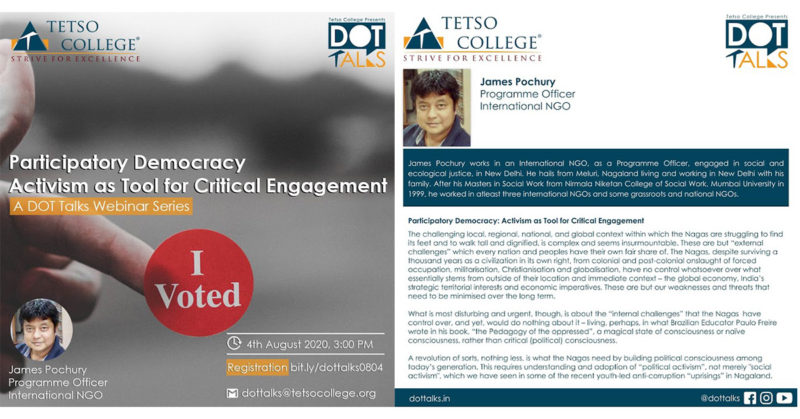Participatory Democracy – Activism as Tool for Critical Engagement
The challenging local, regional, national, and global context within which the Nagas are struggling to find its feet and to walk tall and dignified, is complex and seems insurmountable. These are but “external challenges” which every nation and peoples have their own fair share of. The Nagas, despite surviving a thousand years as a civilization in its own right, from colonial and post-colonial onslaught of forced occupation, militarisation, Christianisation and globalisation, have no control whatsoever over what essentially stems from outside of their location and immediate context – the global economy, India’s strategic territorial interests and economic imperatives. These are but our weaknesses and threats that need to be minimised over the long term.
What is most disturbing and urgent, though, is about the “internal challenges” that the Nagas have control over, and yet, would do nothing about it – living, perhaps, in what Brazilian Educator Paulo Freire wrote in his book, “the Pedagogy of the oppressed”, a magical state of consciousness or naïve consciousness, rather than critical (political) consciousness.
A revolution of sorts, nothing less, is what the Nagas need by building political consciousness among today’s generation. This requires understanding and adoption of “political activism”, not merely “social activism”, which we have seen in some of the recent youth-led anti-corruption “uprisings” in Nagaland.
Indeed, it hardly matters who (CM candidate) or which party comes to power in the “Indian puppet-state of Nagaland”. The unjust and unequal power structures continue their hegemonic imperialistic rule, through what could be termed in Nagas’ context, as a sham Indian parliamentary form of electoral democracy. This hegemonic status quo cannot be left un-challenged and un-interrogated, because, the Nagas already have their own un-defiled traditional institutions of participatory democracy, regardless of whether it is protected by Article 371-A or not. And this needs to be deployed in the way Antonio Gramsci mentioned, as an instrument of “counter-hegemony”.
Not necessarily to overthrow anyone or any regime, but certainly with an intention to disrupt the unjust and unequal power structures and systems that perpetuate the status quo – where the powerful (elected) become even more powerful and the powerless Naga masses (the electors) become perennially powerless. Totally dependent and beholden to the very powerful who make them powerless in the first place. To actively promote social and economic justice, where a win-win equation is a non-negotiable principle – asserted, demanded and enjoyed by an alert and conscious Naga citizenry. Fulfilled by a transparent and accountable governance system that is embedded in Naga ethos, expressed in Naga Democratic Socialism. We cannot take on the powerful status-quoists with the same mindset that created the problem in the first place. We must become powerful to take on the powerful. Through counter-hegemony.
Time: 3:00 PM

